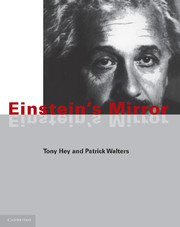Book contents
- Frontmatter
- Contents
- Preface
- 1 A revolution in time
- 2 The nature of light
- 3 Light and time
- 4 The ultimate speed
- 5 E = mc2
- 6 Matter and anti-matter
- 7 Little Boy and Fat Man: relativity in action
- 8 Down to earth
- 9 Warped space
- 10 The Big Bang, black holes unified fields
- 11 Afterword: Relativity and science fiction
- Appendix: Some mathematical details and derivations
- Chronology
- Glossay
- Quotations and sources
- Suggestions further reading
- Name index
- Subject index
- Plate section
1 - A revolution in time
Published online by Cambridge University Press: 05 March 2013
- Frontmatter
- Contents
- Preface
- 1 A revolution in time
- 2 The nature of light
- 3 Light and time
- 4 The ultimate speed
- 5 E = mc2
- 6 Matter and anti-matter
- 7 Little Boy and Fat Man: relativity in action
- 8 Down to earth
- 9 Warped space
- 10 The Big Bang, black holes unified fields
- 11 Afterword: Relativity and science fiction
- Appendix: Some mathematical details and derivations
- Chronology
- Glossay
- Quotations and sources
- Suggestions further reading
- Name index
- Subject index
- Plate section
Summary
My solution was really for the very concept of time, that is, that time is not absolutely defined but there is an separable connection between time and the signal, velocity. Five weeks after my recognition of this, the present theory of special relativity was completed.
Albert Einstein, Kyoto Address, 1922Einstein's revolution
The famous Russian scientist Lev Landau used to keep a list of names, in wich he graded, physicists into ‘leagues’. The first division contained the names of physicists such as Niels Bohr, Werner Heisenberg and Erwin Schroedinger, the founding fathers of modern quantum physics, as well as historical ‘giants’ such as Isaac Newton. He was rather modest about his own classification, grading himself 2½, although he later promoted himself to a 2. Most working physicists would be happy even to make it into Landau's fourth division: David Mermin, a well-known and perceptive American physicist, once wrote an article entitled ‘My life with Landau: homage of a 4½ to a 2’. What is the point of this story? The point is that any book about relativity is inevitably also about Albert Einstein, and Einstein was a remarkable physicist by any standard. Landau, in fact, created a special ‘superleague’ containing only one physicist, Einstein, whom he classified uniquely as a½. Thus, the popular opinion that Einstein was the greatest physicist since Newton is widely shared among professional physicists.
When Einstein wrote about ‘The wonderful events which the great Newton experienced in his younger days…’, and commented that, to Newton, Nature was ‘an open book’, he could well have been writing about himself.
- Type
- Chapter
- Information
- Einstein's Mirror , pp. 1 - 22Publisher: Cambridge University PressPrint publication year: 1997



